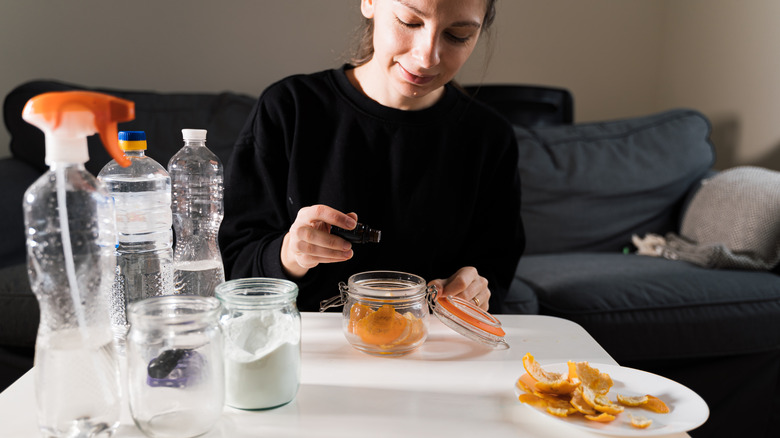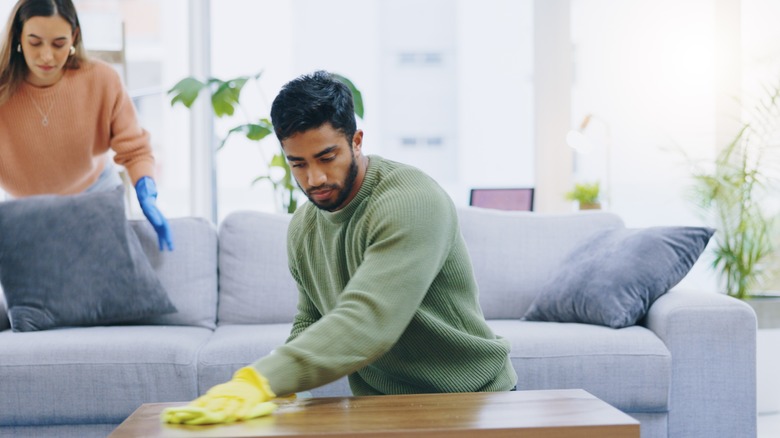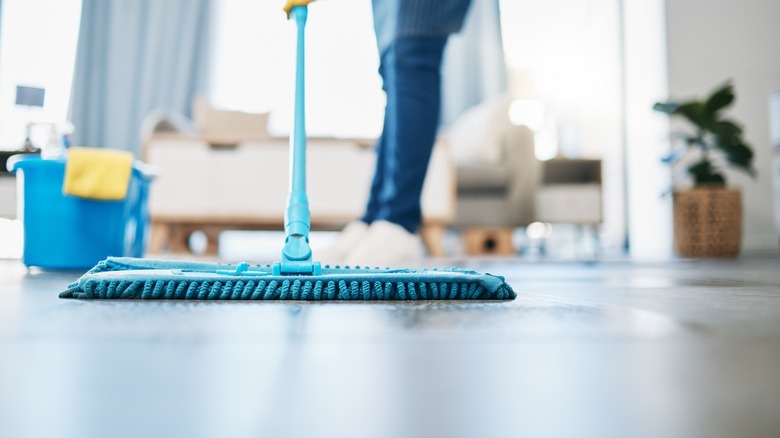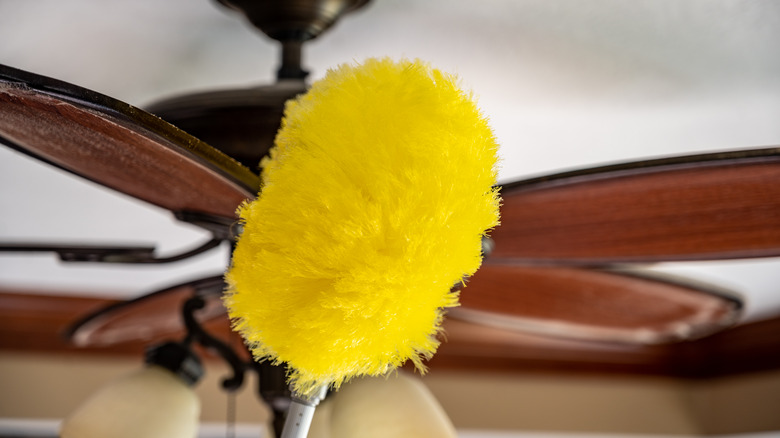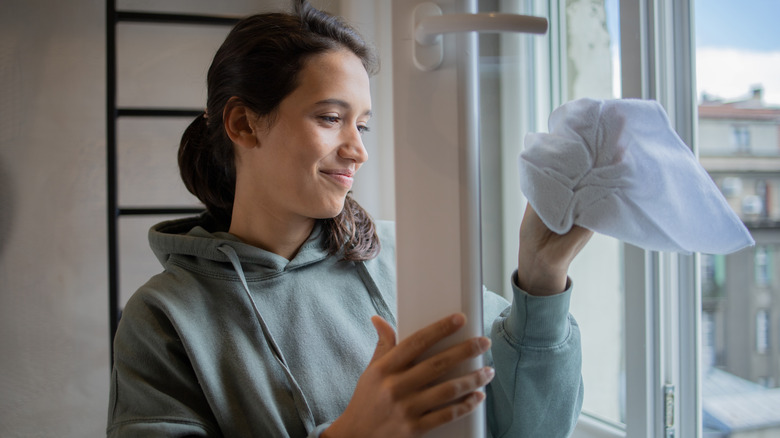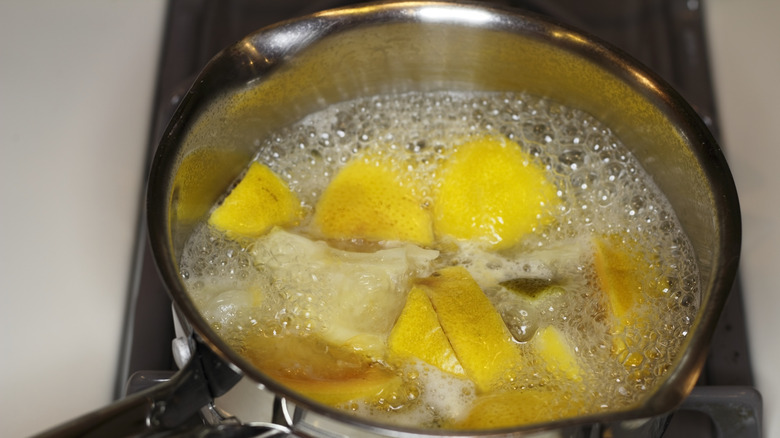Easy Lemon Cleaning Hacks For A Sparkling Clean Living Room
Lemon is perhaps the one scent most associated with cleanliness. In fact, a 2005 study published in Psychological Science suggests that the mere smell of lemon could cause you to be more cleaning-conscious. Not only does lemon scent bring sanitary thoughts to mind, but the juice of this acidic fruit can also literally help make your home cleaner. According to WebMD, the citric acid in lemons has antibacterial capabilities and may also kill other germs as well. Such properties are certainly welcome in high-traffic spaces, such as your living room.
Given the potential benefits of lemon for cleaning, it's no wonder so many commercial cleaner brands contain lemon oil or synthetic citrus fragrances in their products. If you're wanting to leverage lemon via more natural methods though, you'll certainly want to steer clear of chemical-laden cleaners from the store. The good news is, there are a variety of uses for citrus around the house you can try, that call for whole lemons or lemon essential oil, sans any harsh compounds, such as hypochlorite or ammonium. With a little bit of time and preparation, you can use lemons to create DIY cleaners for living room floors, furniture, windows, and more. As a bonus, there are even ways you can use lemon as an air freshener for your living room to give it that extra clean scent.
Polish your wood furniture with a lemon juice-containing DIY cleaner
If you want to clean your home with as few chemicals as possible, save a few dollars, or have simply run out of wood polisher — the solution might be sitting in your fridge. For this DIY, you can use either bottled lemon juice or freshly squeezed juice. Store-bought products also contain lemon, but they may contain other ingredients some families try to avoid, including petroleum naphtha and aromatic solvents such as C12-20 isoparaffin. Making your own lemon wood polish solution can be healthier and more environmentally-friendly, it can also work just as well as commercial products, and help you save money.
To create a thin solution for cleaning and shining wood, mix two parts lemon juice to one part olive oil. For a thicker solution that contains more oil, reverse the ratio. Vigorously shake to blend. Apply the product with a soft, clean cloth. You can use this DIY polisher to add shine to wood chairs, tables, cabinets, dressers, and more. But before you start polishing every wooden piece of furniture in your house, it's important to test a small, non-conspicuous area on each of the pieces you plan to polish. This is to ensure that the citric acid in the lemon juice doesn't stain the wood, particularly in older pieces of furniture that might be worn and more susceptible to damage.
Safely clean laminate floors with lemon juice or lemon essential oil
There are a number of natural ingredients you can use to clean laminate floors, allowing you to skip the harsh bleach or other commercial products. If you generally like the smell of lemon in floor cleaners you buy at the store, you can recreate this clean scent with all-natural ingredients, and still sanitize your floors. Lemons contain citric acid, which is famous for its antibacterial properties.
To harness these benefits, create your own lemon floor cleaner with 1 cup of white vinegar, 1 cup of lemon juice, and 2 cups of water. To adjust the quantity, simply combine the vinegar, lemon juice, and water in a 1:1:2 ratio. You can apply the mix directly on to your floor with a mop, and then rinse it off with clean water once you're satisfied with the amount of dirt you've loosened. You can also eliminate foul odors while disinfecting laminate floors with an easy DIY cleaner recipe that calls for 2 cups of white vinegar and up to 15 drops of lemon essential oil mixed into a bucket of water. While these methods may be effective in cleaning laminate floor, it might be a mistake to use lemon juice to clean a wood floor. With frequent cleanings, the citric acid may gently erode the finish over time and give the planks a dull appearance.
Use lemon juice or lemon essential oil to supercharge your dust-busting routine
Lemon-scented commercial dusting products aren't the only way to get a fresh smell going in your living room. You can easily skip those old aerosol-based cans by creating your own lemon-based cleaner from scratch. The acidic nature of lemon juice can help cut through grime as well as kill certain germs (but not all). Regular dusting with natural ingredients like lemon may also be preferable to commercial cleaning products for those suffering from respiratory issues, which the American Lung Association notes could trigger asthma symptoms in some people.
To successfully remove dust, use a damp cloth and the same recipe as above for wood furniture, which consists of one part lemon juice and two parts olive oil. Run your cloth over baseboards, ceiling fan blades, sideboards, etc. You can also use 3 tablespoons of lemon and one cup of water, as well as white vinegar if you want an oil-free cleaner. Alternatively, a TikTok-inspired spring cleaning hack also notes you can use a combination of water, vinegar, olive oil, and lemon essential oil.
Clean your windows with a DIY lemon spray cleaner
Commercial glass cleaners are usually go-to products when it comes to cleaning mirrors and windows. However, thanks to lemons, you may be able to make your own homemade window cleaner utilizing fresh lemon juice instead.
To create your own DIY window cleaner, mix together 3 tablespoons of lemon juice per every cup of water. Consider placing the cup of water in a spray bottle first, then add the lemon juice. Shake the spray bottle well. After these simple steps, you're ready to spray the lemon juice solution onto your windows, including any you might have in the living room. You can also use the mix on mirrors, glass cabinets, or glass tabletops. Wipe the lemon juice dry with a soft paper or microfiber towel. The only downside to this method is that the fresh lemon juice can spoil. To avoid wasting product, consider using one cup of water and three tablespoons of lemon juice at a time, and then make more if necessary.
Use lemon-infused steam to deodorize your living room
If you've ever looked through commercial room fragrance sprays, you've likely noticed that many brands offer a lemon scent, thanks to the fact that lemon is associated with cleanliness. But before you purchase synthetic lemon air fresheners, here are a few natural ways you can deodorize with lemon to help your living room smell its best.
One method is to boil a pot of lemons and herbs with water and allow the combination to simmer. This technique works best if you have an open floor plan, but you may be able to smell the lemon throughout your house even if your kitchen is separated from the living room area. Despite some online claims that the boiled lemon water purifies the air, so far there is no research to support any substantial purification benefits beyond the scent, so keep this in mind before you try this lemon trend for a fresh-smelling home. However, scientific findings do support the effective use of lemon essential oil for air purification. A 2019 study published in the Journal of Environmental Science and Health revealed that a mixture of lemon and silver fir essential oils significantly reduced the concentration of airborne fungi spores and bacteria in hospital wards. So if you're keen on getting a sanitizing, lemony-fresh scent in your living room without the work of boiling up whole lemons and herbs, consider using lemon essential oil in a diffuser or pot of hot, steaming water instead.

